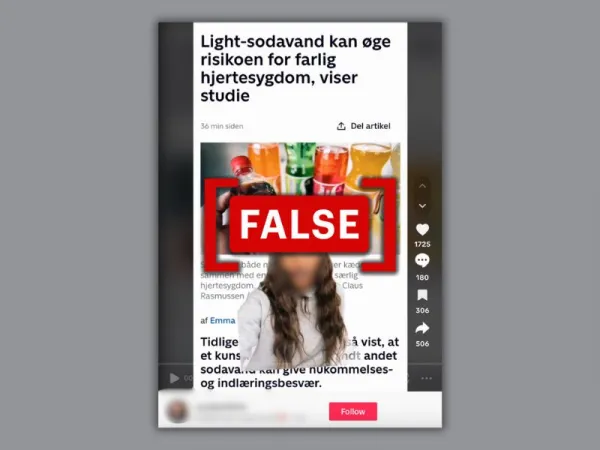By: Nikolaj Kristensen
July 9 2024
 Screenshot of a viral video claiming diet sodas can increase risk of heart disease. (Source: TikTok/Screenshot/Modified by Logically Facts)
Screenshot of a viral video claiming diet sodas can increase risk of heart disease. (Source: TikTok/Screenshot/Modified by Logically Facts)
Approved sweeteners used in diet sodas are generally considered safe as long as you stay inside the Acceptable Daily Intake recommendations.
What is the claim?
"I’ve always known that diet products were unsafe,” says a TikTok user in a video on the platform. “And these sweeteners that people put in their coffee are just as dangerous, (because the body isn’t familiar with it.)”
Behind her is shown a screenshot of an article from Danish news channel TV 2 headlined “Diet sodas can increase risk of dangerous heart disease, study finds."
The video has been viewed more than 52,000 times.
However, diet products and sweeteners are not generally unsafe and dangerous, and TV 2 has changed the article in question to reflect that the study found no causal relationship between diet sodas and heart disease.
In fact
According to the NHS, all sweeteners undergo a rigorous safety assessment before they can be used in food and drink, and all approved sweeteners are considered a safe and acceptable alternative to using sugar.
On its website, the Mayo Clinic notes that in general, artificial sweeteners are safe in limited amounts for healthy people, and that various health agencies have clarified that sugar substitutes do not cause serious health problems.
Last year, the World Health Organization listed the commonly-used artificial sweetener aspartame as a “possible human carcinogenic,” citing “limited evidence."
Francesco Branca, Director of WHO’s Department of Nutrition and Food Safety said at the time, that “The assessments of aspartame have indicated that, while safety is not a major concern at the doses which are commonly used, potential effects have been described that need to be investigated by more and better studies.”
The FDA disagreed with the classification, reaffirming its own finding that aspartame is safe in the amounts that people consume it.
The study reported on by TV 2 and used in the TikTok video was published in the journal Circulation: Arrhythmia and Electrophysiology back in March.
The study found that consumption of sugar-sweetened beverages (SSB) and artificially sweetened beverages (ASB) was associated with higher risk of atrial fibrillation (AF), a condition that can lead to blood clots and increase risk of stroke and heart failure.
The authors stressed that the study didn’t find a causal relationship that the intake of these types of beverages increased the risk.
“This study does not demonstrate that consumption of SSB and ASB alters AF risk but rather that the consumption of SSB and ASB may predict AF risk beyond traditional risk factors,” the study says.
Lead study author Ningjian Wang told Science Daily that "Our study's findings cannot definitively conclude that one beverage poses more health risk than another due to the complexity of our diets and because some people may drink more than one type of beverage."
Science Daily noted that the limitations of the study include that the findings were observational and cannot prove causation between consumption of certain types of beverages and atrial fibrillation risk and that the findings relied on participants to recall their own diets, so there may have been memory errors or bias.
TV 2 has since updated the article to reflect that the study did not find a causal relationship. The headline that previously read "Diet sodas can increase risk of dangerous heart disease, study finds" was changed to "Study indicates link between diet sodas and risk of dangerous heart disease."
Furthermore, TV 2 added several paragraphs with comments from Theis Lange, a professor of biostatistics at the Department of Public Health at Copenhagen University, listing a number of shortcomings of the study and underlining that it doesn’t prove a causal relationship between intake of diet sodas and heart disease.
The verdict
Artificial sweeteners used in diet sodas are generally considered safe within recommended limits for healthy people. The study discussed in the video did not find a causal relation between intake of diet sodas and risk of heart disease. Therefore, we have marked this claim as false.